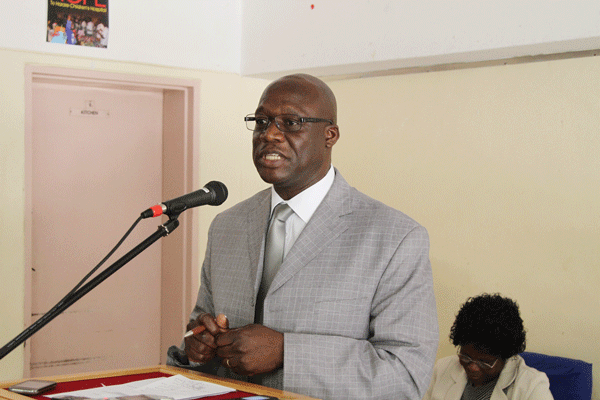
HEALTH and Child Care secretary Gerald Gwinji yesterday urged government to urgently disburse the $1,2 million allocated for malaria control this year to combat the seasonal disease, which is on an upsurge due to incessant rains.
by VENERANDA LANGA

Gwinji appeared before the Ruth Labode-led Parliamentary Portfolio Committee on Health and Child Care where he told MPs that political instability in Mozambique that has seen an increased number of refugees along the eastern border, inadequate insecticides, flooding, artisanal mining and cross-border trading were some of the factors resulting in an upsurge of malaria cases in the country.
The Health secretary and other officials from the ministry had been called to speak on disease prevention and treatment interventions that government was undertaking in flood-affected areas.
“From January to date, there was an increase of malaria cases as compared to the same period last year, and so far in 2017 a total 134 224 cases and 194 deaths from malaria were reported compared to 80 964 cases for the same period in 2016,” Gwinji said.
“So far in 2017, 127 091 cases and 113 deaths from watery diarrhoea were reported compared to 127 720 cases for the same period in 2016.”
He said acute malnutrition characterised by kwashiorkor and marasmus cases were reported from January to date comprising of 7 731 compared to 4 457 reported in 2016.
With respect to the first three months of 2017 regarding typhoid, Gwinji said 1 934 cases and four deaths were reported compared to 2 352 cases in 2016 and nine deaths, while there were five suspected cholera cases and four deaths from cholera which occurred in Chipinge (three) and one in Mudzi.
- Chamisa under fire over US$120K donation
- Mavhunga puts DeMbare into Chibuku quarterfinals
- Pension funds bet on Cabora Bassa oilfields
- Councils defy govt fire tender directive
Keep Reading
As from March 26, 2017, a total of 154 malaria outbreaks have been reported in the country, with 83 successfully controlled and 71 still being managed.
With respect to typhoid, Harare suburbs of Mbare recorded 278 cases, Glen View 142, Budiriro 131 and Hatcliffe 64, with the epicentre being Mbare, where the cases started and spread to other provinces due to people using Mbare Musika to travel to their rural homes.
While the Sipepa area in Tsholotsho was hit by severe flooding, Gwinji said there was pre-elimination of malaria, but added the ministry had to be wary about the malaria parasite after floods hit the area.
Although most of the programmes are financed by Unicef, the World Food Programme and other donor agencies, Gwinji said the ministry had moved in quickly to avert disease outbreaks in flood-hit areas.
Shamva South MP Joseph Mapiki (Zanu PF) claimed after the flooding, several people in Shamva were bitten by snakes.
Gwinji said since the beginning of the year, 5 605 cases of snake bites and 38 deaths were recorded.
He urged people to clear their backyards and avoid going into bushes to avoid snake bites.











